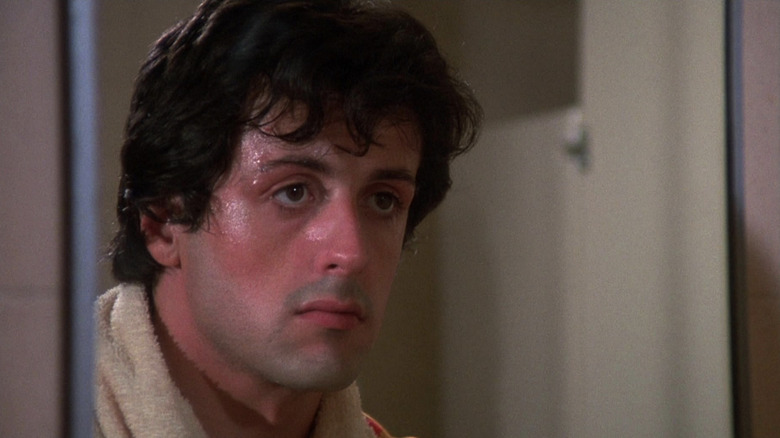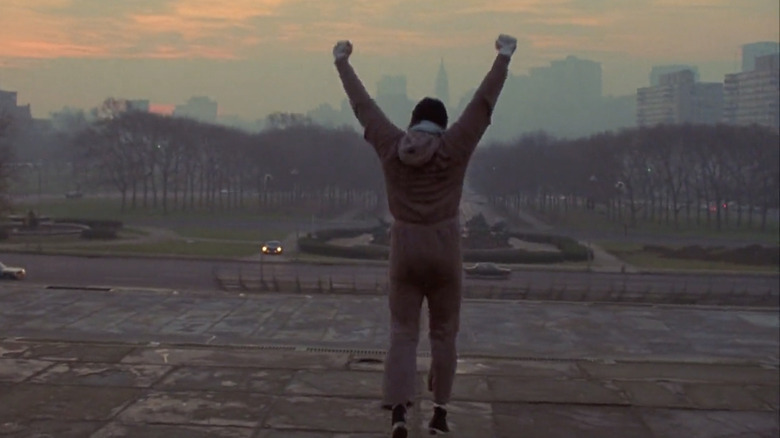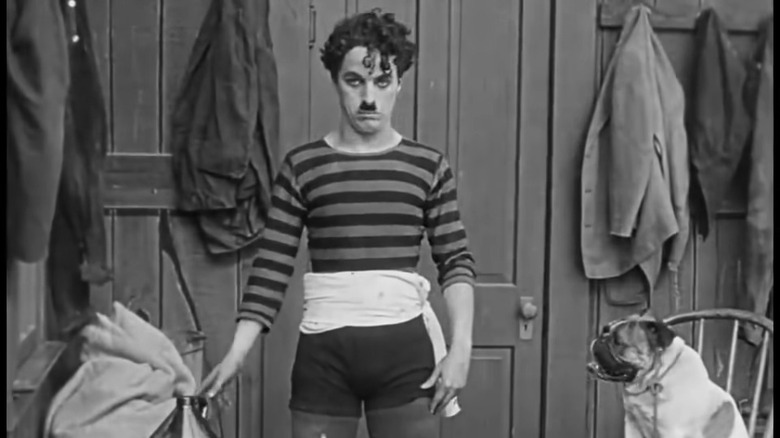Charlie Chaplin Saw Himself In Sylvester Stallone's Rocky
When Sylvester Stallone wrote "Rocky," he was a poor, struggling actor living in a crappy apartment with a baby on the way. After he completed the script, Stallone refused to sell it until the studio agreed to cast him in the lead role. It was a huge gamble for a no-name actor and first-time screenwriter, but it paid off in the end.
Stallone's story about the underdog southpaw was a huge hit with audiences and became one of the most popular sports movies ever. After four decades, five sequels, and three spin-offs, it's clear that audiences still connect with the story of Rocky Balboa, but is his journey all that original? Well, no.
There's a long and rich history of underdog stories in literature, film, music, and even certain religious traditions, so it could be argued that rooting for the underdog has become something of a reflex for humanity. Stallone took advantage of this instinct to connect with the dark horse in his "Rocky" screenplay, but he was shocked when he discovered that a legendary actor identified with his iconic underdog.
In a 2010 interview with GQ, Stallone recalled receiving a letter from silent film star Charlie Chaplin, who recognized one of his characters in "Rocky."
Rocky vs. Chaplin's Champ
Stallone told GQ that, shortly after the release of "Rocky," he received a letter from one of the world's most famous silent comedians, Charlie Chaplin. The actor couldn't believe someone of Chaplin's status would reach out to him, but the two had a lot more in common than Stallone realized at the time. According to Sly, Chaplin wrote, "Rocky reminds me of a little character I used to play."
Way back in 1915, silent films were already embracing the underdog trope, and Chaplin played the role like no other. In his classic "The Champion," Chaplin is a broke, struggling man who fights his way to the top of the boxing world. When the silent film star saw "Rocky," he couldn't help but compare the two characters, and for good reason.
Both Rocky and Chaplin's Champ begin their journey at the bottom. Rocky takes small-scale fights for minuscule money and breaks legs for a loan shark for a measly $20 here and there. The Champ is jobless, wearing dirty, torn clothes, and down to his last morsel of food. Both men are offered a chance to fight a heavyweight boxer for extra cash, and both men take the gig. Both films feature a training sequence with a demanding mentor, a shy love interest, a loyal canine friend, and a dramatic ending battle.
Unlike the dramatic "Rocky," Chaplin's underdog story is full of physical comedy and gags, but the characters are very similar. They are both struggling to survive financially, looking for an opportunity for greatness, and determined to prove themselves worthy.
Creed and Bob Uppercut
Rocky's match with Creed is a 15-round fight of fists and heart. Balboa gives the heavyweight everything he has, proving to himself that he's worthy of sharing the same ring with the best. In the end, Rocky loses but earns Creed's respect. After years of low self-esteem and underachieving, Rocky Balboa recognizes his own talent and begins his journey to the top of the boxing world.
Unlike Balboa, Chaplin's champ doesn't rely on talent or passion to fight. Instead, he slips a horseshoe into his boxing glove and makes quick work of his first sparring partner. The boxing world praises the newcomer, thinking he's a prodigy and recognizes him as champion material. At the end of the film, he fights a heavyweight champion called Bob Uppercut. During the final encounter, the Champion decides not to use the horseshoe and manages to land a few punches, but his opponent quickly recovers. In a comedic twist, the Champ's dog enters the ring, latches onto his opponent's rear, and takes him down. Chaplin is celebrated as the champion.
Rocky and the Champ begin their stories in the gutter, take steps to better their lives, and come out on top, but there is a huge difference in how they do it. Rocky jogs, eats raw eggs, and slices his eyelid open to keep up with Creed, while Chaplin slips a horseshoe in his glove and sics his dog on Bob Uppercut. Even though Rocky's actions are morally superior to the Champ's, it's impossible not to root for both of them.
Despite their different strategies, the underdog characters in "The Champion" and "Rocky" both inspire audiences to dream and to believe in the impossible, which is exactly why most people fall in love with movies in the first place.


